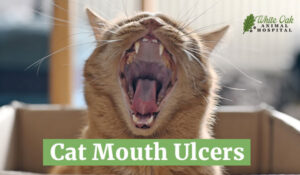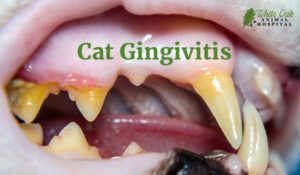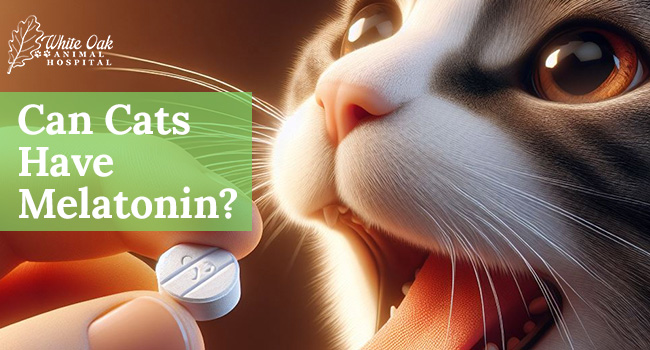
Can cats have melatonin? Understanding the potential benefits and considerations of administering melatonin to our feline companions requires a foundational grasp of the hormone’s role in the body. Melatonin, a naturally occurring substance housed within the pineal gland of humans and animals, is a pivotal regulator of sleep cycles. Its production typically surges in response to diminishing light, acting as a biological signal for the body to transition into a state conducive to rest and rejuvenation.
This natural process prompts various physiological changes, preparing the body for sleep onset. However, in certain circumstances, such as disruptions in the body’s internal clock or environmental stressors, this delicate balance may falter, leading to sleep disturbances or irregularities. Within this context, the potential role of melatonin supplementation for cats comes into focus, offering a means to support and optimize their sleep-wake cycles.
Can cats have melatonin?
 When pondering the question, “Can cats have melatonin?” it’s essential to delve into how this hormone operates within our feline companions. Melatonin, originating from the pineal gland in humans and animals, including cats, is pivotal in regulating sleep-wake cycles. This natural substance, triggered by diminishing light, is a biological cue for the body to prepare for rest. In cats, as in other mammals, melatonin production tends to increase during periods of darkness, fostering a sense of relaxation and readiness for sleep.
When pondering the question, “Can cats have melatonin?” it’s essential to delve into how this hormone operates within our feline companions. Melatonin, originating from the pineal gland in humans and animals, including cats, is pivotal in regulating sleep-wake cycles. This natural substance, triggered by diminishing light, is a biological cue for the body to prepare for rest. In cats, as in other mammals, melatonin production tends to increase during periods of darkness, fostering a sense of relaxation and readiness for sleep.
Understanding this fundamental mechanism sheds light on the potential benefits of melatonin supplementation for cats, particularly in addressing sleep-related issues and promoting overall well-being. By comprehending the workings of melatonin within feline physiology, pet owners can navigate its potential applications with informed awareness, seeking to optimize the health and comfort of their cherished companions.
Exploring the Benefits of Melatonin for Cats
Regulation of Sleep Patterns
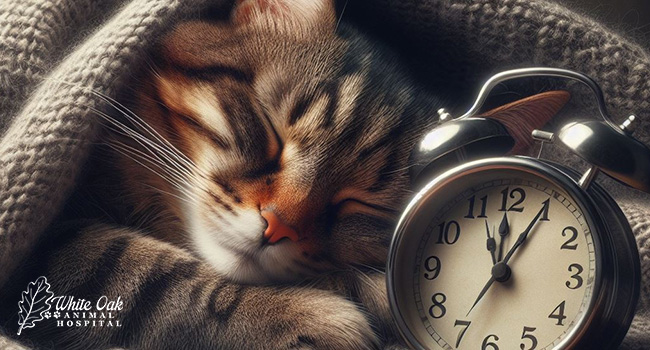 One significant benefit of melatonin for cats is its ability to regulate sleep patterns. Like humans, cats can experience disruptions in their sleep-wake cycles due to various factors. Introducing melatonin supplements can help normalize these patterns, ensuring more consistent and restful sleep for our feline companions. By addressing sleep disturbances, melatonin promotes physical well-being and emotional comfort for cats. This aspect emphasizes the potential value of melatonin supplementation in fostering a harmonious and balanced sleep routine for our cherished pets. Can cats have melatonin? Understanding its benefits may provide insights into improving feline sleep health.
One significant benefit of melatonin for cats is its ability to regulate sleep patterns. Like humans, cats can experience disruptions in their sleep-wake cycles due to various factors. Introducing melatonin supplements can help normalize these patterns, ensuring more consistent and restful sleep for our feline companions. By addressing sleep disturbances, melatonin promotes physical well-being and emotional comfort for cats. This aspect emphasizes the potential value of melatonin supplementation in fostering a harmonious and balanced sleep routine for our cherished pets. Can cats have melatonin? Understanding its benefits may provide insights into improving feline sleep health.
Alleviation of Anxiety or Stress
Another notable benefit of melatonin for cats is its potential to alleviate anxiety or stress. Like humans, cats can experience unease or tension moments, particularly in unfamiliar or stressful situations. Pet owners may help mitigate these feelings by introducing melatonin supplements, promoting a sense of calmness and tranquility in their feline companions. This aspect highlights the multifaceted nature of melatonin’s effects, extending beyond sleep regulation to encompass emotional well-being. Can cats have melatonin? Understanding its potential to soothe anxiety or stress may offer valuable insights for pet owners seeking to enhance their cats’ quality of life.
Management of Seasonal Changes
 An additional benefit of melatonin for cats lies in its potential to manage seasonal changes. Just as humans may experience shifts in mood or behavior with changing seasons, cats, too, can be affected by environmental variations. Introducing melatonin supplements can help stabilize their internal rhythms, mitigating the impact of seasonal fluctuations on their well-being. This aspect emphasizes the adaptogenic properties of melatonin, offering support to cats in adjusting to seasonal transitions. Can cats have melatonin? Understanding its role in managing seasonal changes may assist pet owners in providing holistic care for their feline companions.
An additional benefit of melatonin for cats lies in its potential to manage seasonal changes. Just as humans may experience shifts in mood or behavior with changing seasons, cats, too, can be affected by environmental variations. Introducing melatonin supplements can help stabilize their internal rhythms, mitigating the impact of seasonal fluctuations on their well-being. This aspect emphasizes the adaptogenic properties of melatonin, offering support to cats in adjusting to seasonal transitions. Can cats have melatonin? Understanding its role in managing seasonal changes may assist pet owners in providing holistic care for their feline companions.
Support for Aging Cats
 An additional benefit of melatonin for cats manifests in its support for aging felines. As cats advance in years, they may encounter changes in sleep patterns and overall well-being. Melatonin supplements can offer support by promoting restful sleep and enhancing comfort for senior cats. This aspect highlights the potential of melatonin to contribute to the quality of life for aging feline companions. Can cats have melatonin? Understanding its role in supporting aging cats may offer insights for pet owners seeking to provide tailored care as their beloved companions enter their golden years.
An additional benefit of melatonin for cats manifests in its support for aging felines. As cats advance in years, they may encounter changes in sleep patterns and overall well-being. Melatonin supplements can offer support by promoting restful sleep and enhancing comfort for senior cats. This aspect highlights the potential of melatonin to contribute to the quality of life for aging feline companions. Can cats have melatonin? Understanding its role in supporting aging cats may offer insights for pet owners seeking to provide tailored care as their beloved companions enter their golden years.
Potential Risks and Side Effects
 When considering the question “Can cats have melatonin?” it’s crucial to weigh the potential risks and side effects of supplementation. While melatonin is generally considered safe for feline use when administered appropriately, there are possible adverse effects. These may include drowsiness, gastrointestinal upset, and alterations in mood or behavior.
When considering the question “Can cats have melatonin?” it’s crucial to weigh the potential risks and side effects of supplementation. While melatonin is generally considered safe for feline use when administered appropriately, there are possible adverse effects. These may include drowsiness, gastrointestinal upset, and alterations in mood or behavior.
Furthermore, there is a risk of overdosing if the supplement is not administered according to recommended guidelines. Pet owners must exercise caution and consult a veterinarian before introducing any new supplement into their cat’s routine.
By remaining vigilant and informed, pet owners can minimize the likelihood of adverse reactions and ensure the safety and well-being of their cherished feline companions amidst their exploration of melatonin supplementation. Can cats have melatonin? Understanding the potential risks is paramount in making informed decisions regarding its use for feline health.
Safety Tips for Cat Owners Considering Melatonin
Consult with a Veterinarian First
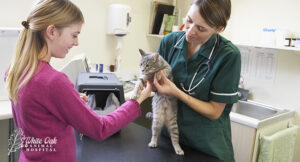 Before considering melatonin supplementation for your cat, it’s crucial to consult a qualified veterinarian. Seeking professional guidance ensures a thorough assessment of your cat’s health, medical background, and unique requirements. This evaluation helps ascertain whether melatonin is appropriate for your cat. Dr. Damron offers tailored advice, addressing any potential risks or contraindications comprehensively. This consultation fosters an open exchange, facilitating informed decision-making and collaborative care for your cat’s overall well-being. Can cats have melatonin? This question emphasizes the importance of seeking veterinary guidance to safely and effectively navigate melatonin use for your feline companion.
Before considering melatonin supplementation for your cat, it’s crucial to consult a qualified veterinarian. Seeking professional guidance ensures a thorough assessment of your cat’s health, medical background, and unique requirements. This evaluation helps ascertain whether melatonin is appropriate for your cat. Dr. Damron offers tailored advice, addressing any potential risks or contraindications comprehensively. This consultation fosters an open exchange, facilitating informed decision-making and collaborative care for your cat’s overall well-being. Can cats have melatonin? This question emphasizes the importance of seeking veterinary guidance to safely and effectively navigate melatonin use for your feline companion.
Start with Low Dosages
 When introducing melatonin to your cat’s regimen, it is advisable to start with low dosages and gradually increase as needed. This cautious approach minimizes the risk of adverse reactions and allows careful observation of your cat’s response to the supplement. Dosage recommendations may vary based on your cat’s age, weight, and overall health condition. By starting conservatively and adjusting dosage levels under veterinary guidance, you can optimize the safety and efficacy of melatonin supplementation for your cat. Can cats have melatonin? With diligent monitoring and veterinary support, pet owners can safely navigate the introduction of melatonin to their cat’s routine.
When introducing melatonin to your cat’s regimen, it is advisable to start with low dosages and gradually increase as needed. This cautious approach minimizes the risk of adverse reactions and allows careful observation of your cat’s response to the supplement. Dosage recommendations may vary based on your cat’s age, weight, and overall health condition. By starting conservatively and adjusting dosage levels under veterinary guidance, you can optimize the safety and efficacy of melatonin supplementation for your cat. Can cats have melatonin? With diligent monitoring and veterinary support, pet owners can safely navigate the introduction of melatonin to their cat’s routine.
Monitor for Any Adverse Reactions
When considering the question, “Can cats have melatonin?” it’s crucial to prioritize vigilant monitoring for any signs of adverse reactions when administering this supplement to your feline companion. Common adverse effects may manifest as drowsiness, gastrointestinal upset, or alterations in mood or behavior. Therefore, observing your cat closely after administering melatonin and promptly reporting any concerning symptoms to your veterinarian is imperative. By remaining attentive to your cat’s well-being and swiftly addressing any issues that arise, you can ensure timely intervention and minimize the impact of potential adverse reactions.
Keep Melatonin Supplements Out of Reach
To prevent accidental ingestion or misuse, storing melatonin supplements securely and out of reach of your cat is imperative. Ensure the packaging is sealed tightly and stored in a location inaccessible to curious paws. By exercising caution and diligence in storing melatonin supplements, you can mitigate the risk of unintended exposure and maintain a safe environment for your cat. Can cats have melatonin? While it may benefit cats in certain circumstances, pet owners must approach supplementation with diligence and informed awareness.
 When considering the question, “Can cats have melatonin?” it’s crucial for pet owners to prioritize the safety and well-being of their beloved feline companions. Consulting with Dr. Damron at White Oak Animal Hospital is strongly encouraged before initiating melatonin supplementation.
When considering the question, “Can cats have melatonin?” it’s crucial for pet owners to prioritize the safety and well-being of their beloved feline companions. Consulting with Dr. Damron at White Oak Animal Hospital is strongly encouraged before initiating melatonin supplementation.
At White Oak Animal Hospital, pet owners can access integrative options unavailable elsewhere, with telemedicine consultations in traditional Chinese veterinary medicine (TCVM) and over 28 years of veterinary experience. For those seeking guidance or assistance, White Oak Animal Hospital stands ready to provide expert care and support tailored to your cat’s individual needs.
Frequently Asked Questions
Can cats have melatonin to help with travel anxiety?
Yes, melatonin supplements can be beneficial for cats experiencing travel anxiety. It may help calm their nerves and make the journey more comfortable. However, it’s essential to consult a veterinarian for proper dosage and administration.
Is melatonin safe for kittens?
While melatonin is generally safe for adult cats, its use in kittens should be cautiously approached. Kittens have developing systems, and dosage adjustments may be necessary. Consultation with a veterinarian is recommended before administering melatonin to kittens.
Can melatonin help with my cat’s hairballs?
Melatonin is primarily used to regulate sleep patterns and manage anxiety in cats. While it may indirectly contribute to hairball reduction by promoting relaxation and better digestion, it’s not specifically targeted for this purpose. Other remedies or dietary adjustments may be more effective for addressing hairball issues.
Related Posts
-
What Are The Health Benefits of Milk Thistle for Cats and Dogs?
Milk thistle is a plant used for centuries to treat liver ailments in humans. Although…
-
How Melatonin for Dogs Promotes Relaxation
Just like people, dogs experience stress for a number of reasons. Some dogs feel nervous…
-
Food Therapy for Cats
Could your feline benefit from food therapy for cats? Yes! In fact, you can help…
-
How Psyllium Husk Powder Prevents Hairballs In Cats
Has your cat ever vomited a tubular mass of fur? Don’t be alarmed, it’s just…








